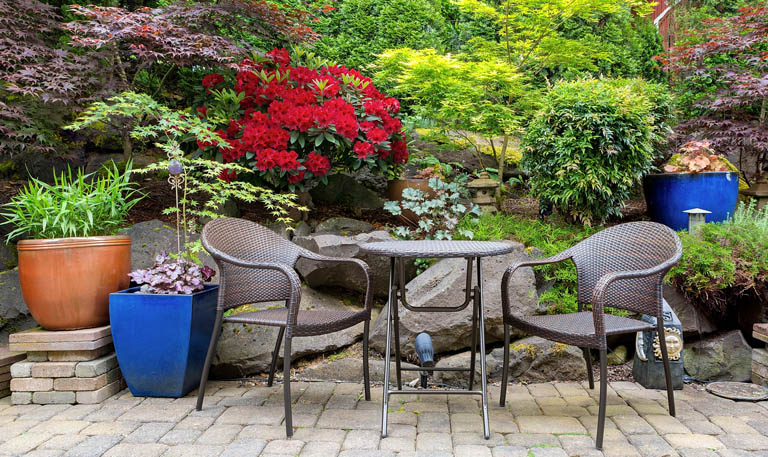We are in our garden, entertaining friends. Prosecco has been poured. Topics ensue—the astonishing political and cultural events beyond our understanding or control, our slightly more manageable issues of health, remembered vagaries and pleasures of travel. Leaning forward, Bob asks enthusiastically, “Where would you like to go?” We’re all a little COVID crazed, you see, after 2 + years of restrictions. Nevertheless, I launch a contrarian stay put screed, for those restrictions encouraged me to think about why I want—or at times in my life wanted to—travel, and I recalled my reasons often to be stupid or vain like creating memories, inspiring envy, competing with friends, acquiring stories.
Accepting that human beings are wired to travel and trade, to appropriate and quarrel, I would like to argue for the opposite. I would like to sing the praises of staying put. Over a span of 20 years, my wife and I have made this garden our sanctuary, which we sit in now, sipping our Prosecco under a towering canopy of Maple and sprawling Viburnum whose drifts and angles echo an Utagawa Hiroshige wood block print. Why, I ask our guests, leave this hard-won paradise to travel? This visit in the garden brings to mind Thoreau.
A sensible, if philosophic fellow, he tried heroically to act in alignment with his values, and mostly did quite well. This made him prickly and impatient with America’s fervid ethos to progress, and tellingly, his life spanned two epochs—that of the colonial era farm and the Industrial Revolution, or the beginning of what we now call the Anthropocene. While Walden Pond was well within reach of town life—the railway skirted along one bank edge, fences could be seen along another—those two worlds, like the two epochs, offered a balance between solitude and social engagement. Thoreau’s sojourn at The Pond revealed the virtues of a crafted solitude rooted in nature. For two years and two months Walden Pond was his performance piece. An experiment in the principled uses of freedom, his performance focused on their exercise after the necessities of food, clothing, and shelter have been met. In a society defined by the right to freedoms, its citizens, one might opine, are obliged to use them well. Americans are, with those precious freedoms, entitled to do so many things—shoot people, consume willy nilly, unobliged to recognize the impact our behaviors have on animals, the environment, and each other. Conversely, we are free to live wisely and in tune with nature.
In this context, I try to understand my reluctance to travel. It’s not that I want to do nothing or go nowhere or disengage. More and more, I just require meaning—if you tell me you’re taking a trip to the moon in mid-July, I will have to ask you, “Why?” Are you trying to inspire me or inspire envy?
It wasn’t always like this. I had my list, as many of us do—the must-see places: Patagonia for Darwin and the stars; Scotland for the rocks and whiskey. But the unique pressures exerted by the climate crisis have made my relationship to travel queasy. To check off the items on my list, as motive, is no longer justified. That said, I have had my place at that table and I cannot deny you yours.
Once, I would have hitch hiked most anywhere without qualm. It was simply done then, back in the 60s and 70s. I’d haul some then best friend, and off we’d go—from Pennsylvania to Toronto, Amsterdam to Dublin. It would not occur to us—young women, giddy with the belief in our invincibility, and in a friendly world—that this was patently risky. Can you imagine? Doing that now would summon violence and transgression, and any young woman poking her thumb out onto the highway would have to be out of her mind. Is my preference to stay put a triumph of anxiety or the adjustment to my more limited means?
Here is the evidence of my aging—complaining joints, impaired vision, the sudden pain from an otherwise innocent shift in my position. I am more comfort than journey bound, and my diminished appetite for travel reflects these physical crumblings. And yet I know of women in their late 70s and 80s still avid for travel, keen to experience treks in wilderness areas and to invite new knowledge and quickened senses. Am I a weenie or am I wise? This concerns me.
“Bob,” I answer, having delivered my cranky, if politically correct screed, “putting aside the knowledge that travel is not without its issues, I have to tell you—we are going to Scotland in September!”
The faces of our guests brighten. We’re back on solid ground. How wonderful, they say. And yes, it is. I have always wanted to go to Scotland. I know half a dozen facts about my birth father, and his Scottish origin is one. This is my motivating bit of meaning. They will go to Portugal, also in September. I have always wanted to go there, too. There will never be an end to “I have always wanted to . . .” Perhaps this is a good thing, the wanting in this case less reflective of the acquisitive appetites than an affirmation of wonderful, ongoing curiosity. But may that curiosity be trained on the reasons for going, and urge us to rethink travel—its appeal, its extravagance, its healthy challenges, and colorful vacuities. Our garden is, after all, a park. We’ve made it so, after 20 years. This factors into the equation of when it’s sensible to travel.
A practicing Buddhist for more than 30 years, Hollis Giammatteo has sought experiences that challenge her practice, from teaching writing to working with the elderly. She co-founded The Wilma Theater in Philadelphia, and was a resident playwright for The Rhode Island Feminist Theatre. Giammatteo has published in a variety of magazines and her memoir, The Shelf Life of Ashes, was released in 2016 by She Writes Press.


